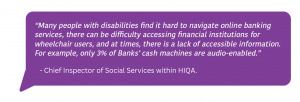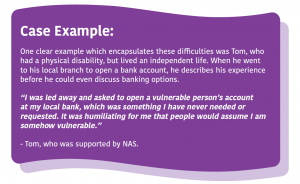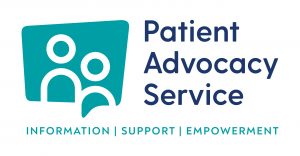“New report on barriers to financial access from the National Advocacy Service highlights that many people with disabilities face financial abuse, discrimination, and obstacles to banking”
Key findings shed light on the growth in advocacy issues relating to financial autonomy and the depth of systemic barriers faced by people with disabilities across the entire financial sector.
The National Advocacy Service (NAS), has today launched their social policy paper, “Shortchanged: Barriers to Financial Autonomy for People with Disabilities in Ireland.” The report highlights the systemic barriers some people with disabilities across Ireland face in accessing and managing their own finances. The findings detailed throughout also reveal that discrimination on the grounds of disability is a recurring concern in current banking practice for many people with disabilities supported by NAS.
The move towards digitalisation across the banking sector has meant that online platforms, complex authentication requirements, a lack of accessible information and automated customer support has resulted in the exclusion of many people with disabilities from conducting basic banking tasks. The trend of problems emerging is consistent across Ireland.

The report also found that the financial sector tends to be overly focused on people with disabilities as ‘vulnerable’ customers rather than citizens with rights. People with disabilities are often directed to the ‘vulnerable customer units’ in financial institutions, when opening or accessing banking accounts and products, or asked to ‘prove’ that they have capacity to manage their money before opening a bank account purely on the basis that they have a disability.

The findings show that many people with disabilities experience financial abuse from service providers or trusted third parties. In some cases, control over a person’s money by third parties is facilitated without an Enduring Power of Attorney or Decision Support arrangement. The advocacy cases throughout reveal the extent of these discriminatory practices, which can greatly limit a person’s autonomy and life choices.

Along with this social policy paper, NAS has also produced an Easy-to-Read leaflet, ‘My Money, My Rights, My Options’, which aims to build financial autonomy and enhance the capacity of people with disabilities to access and manage their own finances. We hope this report will raise awareness of and contribute to beginning a conversation on this important issue and refocus the conversation on supporting people to exercise their capacity in line with the Assisted Decision-Making (Capacity) Act (ADMCA) and The United Nations Convention on the Rights of Persons with Disabilities (UNCRPD).
Joanne Condon, NAS National Manager said: “We are delighted today to share this social policy paper developed by NAS which highlights the critical challenges faced by many people with disabilities in exercising their financial independence. NAS has seen a significant growth in advocacy issues relating to financial autonomy in its overall work; of our total advocacy work in 2023, 12% alone was focused on supporting people with financial advocacy issues. This paper is the culmination of extensive advocacy by NAS to overcome multiple barriers to financial autonomy for people with disabilities. The report amplifies the lived experiences and voices of those supported by NAS, underscoring the urgent need for systemic change.
Financial autonomy is not a luxury, but a fundamental right. Yet, many people with disabilities that we support continue to face persistent obstacles. Whilst we acknowledge the many progressive developments that have occurred within the financial sector, this is a real opportunity to generate further tangible solutions, and the paper provides a roadmap to drive positive change that will empower individuals and promote equality. The report calls for all key stakeholders to join in taking meaningful steps to ensure inclusion and independence for people with disabilities.
The full enactment of the ADMCA has further highlighted the need for a paradigm shift in Irish society. It signifies a move away from the historical pattern of decision-making ‘for’ people with disabilities and viewing people with disabilities as needing protection, to an approach which recognises them as equal citizens, with equal rights capable of making their own decisions.”
About the National Advocacy Service (NAS)
The National Advocacy Service, funded by the Citizens Information Board (CIB), focuses on ensuring the rights of people with disabilities are upheld. NAS provide people with disabilities across Ireland with an independent, professional and free representative advocacy service that helps people to have their voices heard, make decisions and live their lives independently.
Click to read full paper: NAS Social Policy Paper
